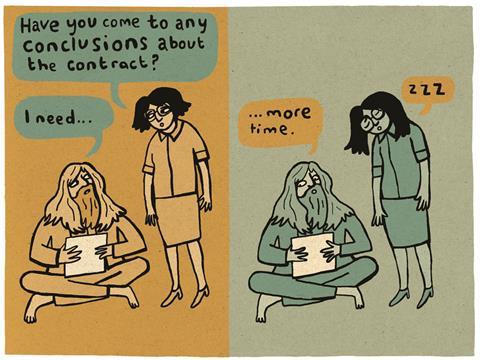A dispute over who should cough up for the costs of making good defects to a penthouse hinged on a fundamental aspect of contract law: what did the contract originally intend?

Doing a deal at the front end of the contract is one thing - and easily leads to trouble after the honeymoon. Doing a deal at the back end of the contract is yet another. This is a story about one of those back-end deals thought by the contractor to put the account and job to bed for good. But it reared an ugly head.
The old West London air terminal in Cromwell Road, London, was ugly too. It went 10 years ago when developer Point West contracted with Mivan Ltd to build 400 apartments for about £10m. Added to that, eventually, was a fit-out to the posh penthouse occupying the top three floors and known as Flat 1601. Global practical completion was achieved in June 2001; not before some excitement required the curtain walling up there to the penthouse to be renewed.
It is important not to attempt by way of the court to remedy any gaps or missing parts; you can’t improve the deal which the parties did not make for themselves
A year later, Mivan and Point West’s quantity surveyors, Davis Langdon and Everest, recorded a final account agreement of £12.5m. By now, Penthouse 1601 was purchased by the Bermuda Trust and occupied by David Gomes Da Costa and family. He knew that the curtain walling was leaking and there was no fuss about him withholding £50,000 against leaks.
Come 2007, six years on, the remedial works had not remedied the defects. Experts were still trying to fathom what’s up. Meanwhile the financial position “was the subject of a number of exchanges between Mivan and Point West” in these six years. Seemingly Mivan was pushing for its final £118k but Point West had contra claims. The stage is set for either a fight or a deal. In October 2007 they did the deal. Mivan took £50k. So be it.
At about the time of this agreement, Point West was owed service charges by the penthouse owner. He was fed up with the leaks and iffy air conditioning and not willing to pay. So they sued him. He counterclaimed and won. He got damages for the defects. Point West blew the dust off the Mivan Agreement come 2011. In short, could the agreement with Mivan be read so that Mivan had to fork out for the losses to Point West for the defects? What did the deal agree? It looks to be that the whole of the curtain walling needs replacing. You might easily see that if you were Point West you would not have done the deal with Mivan at all if it meant losing the chance to put Mivan in the frame for a whopper of a defect.
Interpreting an argument of this type uses the same rules as interpreting a contract. It is a search for what the words in the agreement intend… the intention of the parties so expressed therein. The intention is gathered by putting the words into the particular background knowledge or context.
It is important not to attempt by way of the court to remedy any gaps or missing parts; you can’t improve the deal which the parties did not make for themselves. Then comes a really relevant point. It is that a court or person trying to fathom the intentions of the document has to be very slow to conclude that the agreement was intending to surrender rights and claims of which it was unaware and could not have been aware. Did Point West intend to give up something which neither they nor Mivan knew or could have known they had? If so, the rules of interpretation say the agreements writing must clearly cover that curtailment.
The Mivan affair then turns on its own facts and circumstances. The context or backdrop to the agreement come from exchanges, memos, emails between Point West and Mivan.
For example, one note confirmed that the eventual agreement would conclude Mivan’s responsibilities and obligations in respect of their works at the project.
Another explained how Point West would only be looking for help “in legal aspects of Penthouse 1601”. Another from Point West said “I am not looking to you to do any further remedial works”.
The judge was satisfied it was a settlement of any liability of the contractor and precluded Point West from seeking damages in relation to the defects forming the subject matter of the county court proceedings and any other defects in the Point West development which were patent at 18 October 2007. Easy really. Sort of.

Tony Bingham is a barrister and arbitrator at 3 Paper Buildings, Temple



























No comments yet